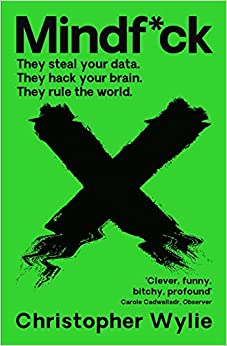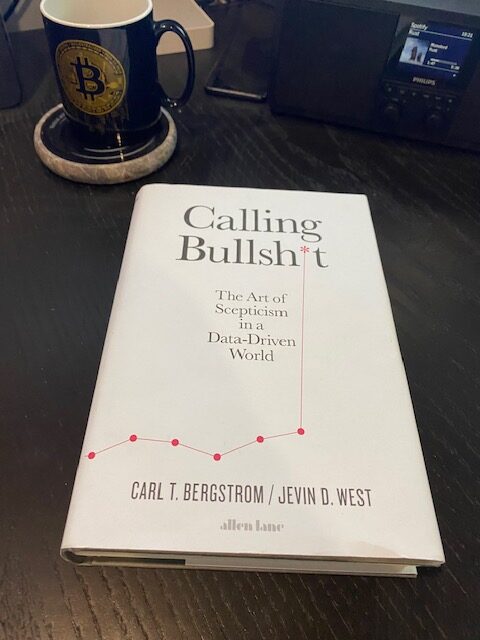Calling Bullsh*t
The Art of Scepticism in a Data-Driven World
TThe Art of Scepticism in a Data-Driven World
Carl T. Bergstrom
Jevin D. West
Bullshit isn’t what it used to be. Now, two science professors give us the tools to dismantle misinformation and think clearly in a world of fake news and bad data.
I think most people that use Social Media are all too familiar with just how toxic it has become. Every few months or so, I conduct research on the platforms to gauge the levels of toxicity that can be found on some of my platforms of choice. I predominantly focus on Twitter and Reddit for the most part, primarily due to the fact that these are the only channels I use.
Over the years I have deleted all other accounts on Social Media platforms because I have found that the actual service that they deliver has nothing to do with Social or Media and relates more with surveillance capital and subversion. Christopher Wylie discusses these aspects more in Mindf*ck: Inside Cambridge Analytica's Plot to Break the World
Mindf*ck
Inside Cambridge Analytica's Plot to Break the World
whistleblower Christopher Wylie, the definitive story of the Brexit coup, the making of Bannon's America, and an ongoing crime against democracy
Why I read this book
There is an ever increasing amount of Misinformation, Disinformation and Fake News being spread throughout the internet, Social Media and even traditional media.It has quite literally reached pandemic levels during the pandemic.
Things have really seem to go up yet another notch with the invasion of Ukraine by the Russian State. It is also well documented and proven without any doubt that one of major purveyors of Misinformation and Disinformation is the Russian State themselves.
In censorship in freemarkets I touched on this subject, in how it relates to the search engine Duck Duck Go decision to down rank known Russian State sources in its index. Clearly this decision touched a nerve among its user base. In my opinion, I believe this is a misunderstanding of what the intention, in that they think the move is a form of censorship, but in reality it's not.
Researching the various profiles of the users that appeared to be so outraged or offended by the search engines move, it became apparent to me that a large proportion of them had actually fallen to victim to Things have really seem to go up yet another notch with the invasion of Ukraine by the Russian State. It is also well documented and proven without any doubt that one of major purveyors of Misinformation and Disinformation themselves.
I came to the realisation that it must be getting increasingly difficult for people to tell the difference between Misinformation, Disinformation and actual information. This is compounded by the fact that we are bombarded with more information everyday and algorithms are used to disseminate information to us based on likes and likes of our supposed friends. There is actually very little verification on the authenticity or even accuracy of the information that regurgitated onto our timelines.Political figures seems to continuously swamp us with data and supposed facts that seem to always be discredited or proven to incorrect.
Political figures seems to continuouslt swamp us with data and supposed facts that seem to always be discredited or proven to incorrect.
I was looking for some answers as to what steps I could take to ensure that the data and information I take in is actually valid.
What I like about this book
The book divides the topic into two phases:
- spotting bullshit
- calling bullshit.
The bulk of the book is devoted to spotting bullshit, with the final chapter addressing how to call bullshit.
The preface and opening chapters of this book do a great job of setting the scene of just how big a problem this has become and why its vitally important we all start making an effort to addressing the problems.
Democracy has always relied on on critically thinking electorate, but never has this been more important than in the current age of fake news and international interference in the electoral process via propaganda disseminated over social media.
Calling Bullshit - The art of scepticism in a data-driven world
The authors note that much of what seems factual and statistically sound is often nothing but bullshit. The authors differentiate between what they refer to as old school bullshit which is mostly rhetorical and language-based, and new school bullshit which refers to the cagey manipulation of mathematics and scientific data to create the illusion of sophistication and factual accuracy.
he book goes into great depth for each topic with chapters dedicated to:
- Causality
- Numbers and Nonsense
- Selection Bias
- Data Visualization
I particularly enjoyed the discussions on the bullshit enabled by artificial intelligence, machine learning, neural networks, and big data. These techniques differ from traditional computer algorithms in the sense that the quality of their output should improve over time as the algorithm learns how to analyse data. However, even for those with substantial training in mathematics, statistics, and computer science, the algorithms are completely mysterious beasts. The authors observe that the details of the machine learning algorithm do not need to be understood in order to call bullshit on the output. The standard principle of GIGO (garbage in, garbage out ) applies: if the input data is flawed, the output of even the best algorithms will be flawed as well.
The book also addresses how the scientific community are also prone to bullshit, which for me was highly relevant considering how much of it we were exposed to it during the pandemic. The authors focus on how the science community relies on their bullshit in competition for funding, publications of positive results, and p-hacking, among others, are helpfully described, along with several infamous examples.
In the conclusion of the book the authors ask the question If bullshit is everywhere, how can we avoid being taken in? The Spotting Bullshit chapter summarises six simple, but powerful guidelines to help you avoid being taken in.
Why I recommend this book
the book delivers a novel approach that goes well beyond looking at bullshit to broader critical thinking. It will benefit anyone assessing the news, social media feed item, political interview or a scientific analysis.
Although the book subject may seem mathematically and statistically focused, it is no way intimidating and the authors do a great job of breaking the content down so it can be easily understood.
The book provides with several tips on how to spot and refute quantitative bullshit and how to use critical thinking when assessing data and information, to sift through the bullshit.
This book will significantly improve any reader's critical thinking. The idea that bullshit can often be detected by only looking at inputs and outputs empowers the general reader by identifying the necessary skills to evaluate arguments and claims without a deep understanding of statistics or data science. This is both novel and powerful.
Calling Bullshit
The Art of Skepticism in a Data-Driven World
Two science professors give us the tools to dismantle misinformation and think clearly in a world of fake news and bad data.
- What is this Directory.Packages.props file all about? - January 25, 2024
- How to add Tailwind CSS to Blazor website - November 20, 2023
- How to deploy a Blazor site to Netlify - November 17, 2023


